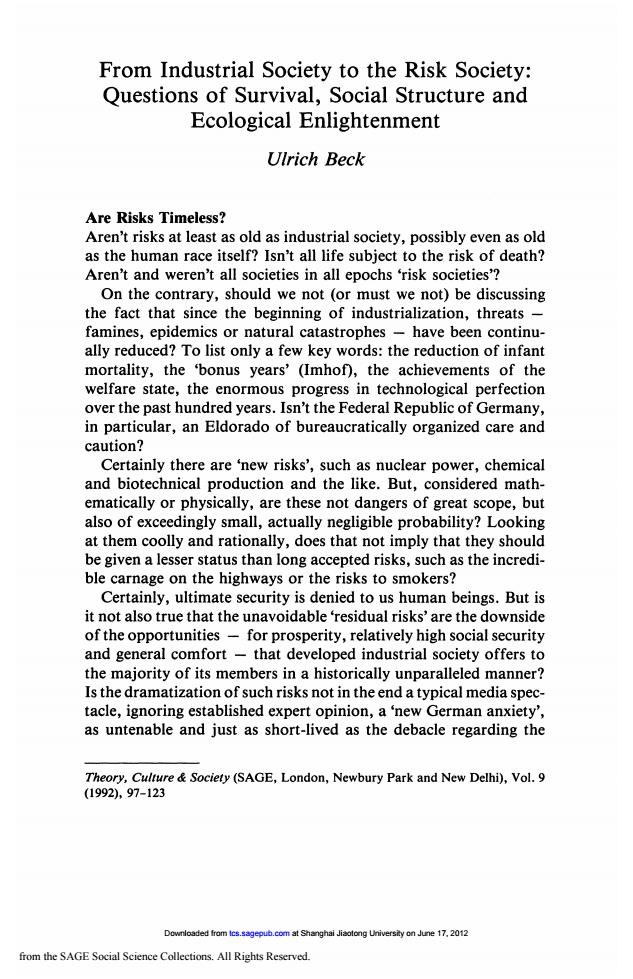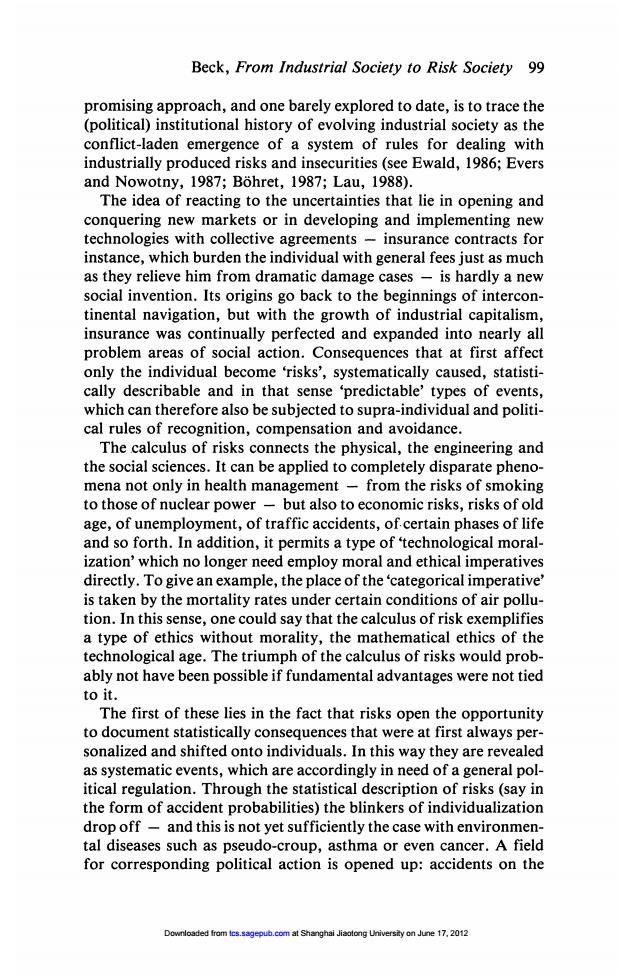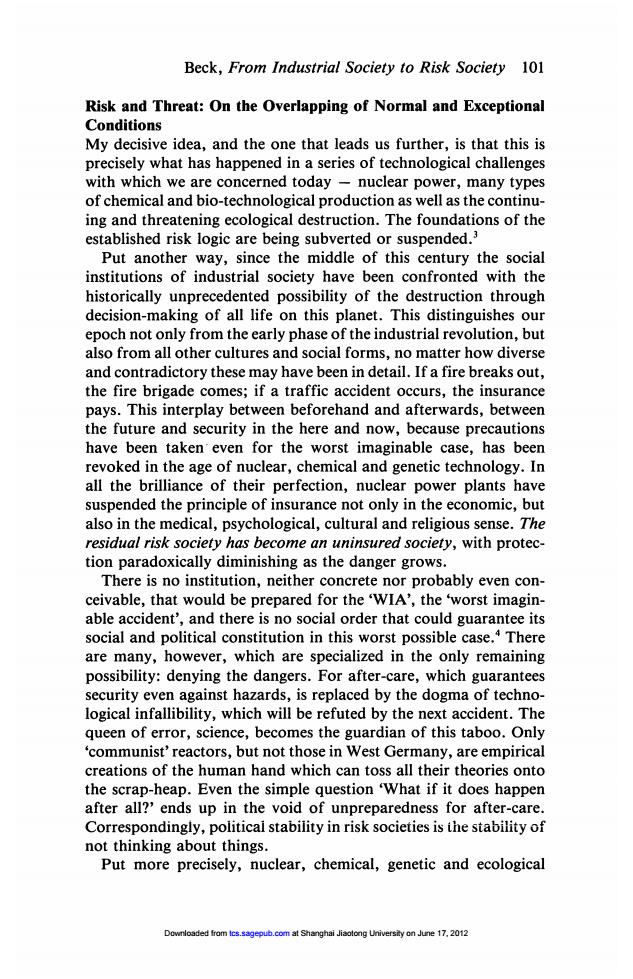
From Industrial Society to the Risk Society: Questions of Survival,Social Structure and Ecological Enlightenment Ulrich Beck Are Risks Timeless? Aren't risks at least as old as industrial society,possibly even as old as the human race itself?Isn't all life subject to the risk of death? Aren't and weren't all societies in all epochs‘risk societies'? On the contrary,should we not (or must we not)be discussing the fact that since the beginning of industrialization,threats famines,epidemics or natural catastrophes have been continu- ally reduced?To list only a few key words:the reduction of infant mortality,the 'bonus years'(Imhof),the achievements of the welfare state,the enormous progress in technological perfection over the past hundred years.Isn't the Federal Republic of Germany, in particular,an Eldorado of bureaucratically organized care and caution? Certainly there are new risks',such as nuclear power,chemical and biotechnical production and the like.But,considered math- ematically or physically,are these not dangers of great scope,but also of exceedingly small,actually negligible probability?Looking at them coolly and rationally,does that not imply that they should be given a lesser status than long accepted risks,such as the incredi- ble carnage on the highways or the risks to smokers? Certainly,ultimate security is denied to us human beings.But is it not also true that the unavoidable 'residual risks'are the downside of the opportunities for prosperity,relatively high social security and general comfort that developed industrial society offers to the majority of its members in a historically unparalleled manner? Is the dramatization of such risks not in the end a typical media spec- tacle,ignoring established expert opinion,a‘new German anxiety', as untenable and just as short-lived as the debacle regarding the Theory,Culture Society (SAGE,London,Newbury Park and New Delhi),Vol.9 (1992),97-123 Downloaded from ics.sagepub.com at Shanghai Jiaotong University on June 17.2012 from the SAGE Social Science Collections.All Rights Reserved
from the SAGE Social Science Collections. All Rights Reserved. Downloaded from tcs.sagepub.com at Shanghai Jiaotong University on June 17, 2012

98 Theory,Culture Society 'railroad sickness'from the end of the preceding century? And finally,aren't risks a central concern of the engineering and physical sciences?What business has the sociologist here?Isn't that once again typical? The Calculus of Risk:Predictable Security in the Face of an Open Future Human dramas -plagues,famines and natural disasters,the looming power of gods and demons-may or may not quantifiably equal the destructive potential of modern mega-technologies in hazardousness.They differ essentially from 'risks'in my sense since they are not based on decisions,or more specifically,decisions that focus on techno-economic advantages and opportunities and accept hazards as simply the dark side of progress.This is my first point: risks presume industrial,that is,techno-economic decisions and considerations of utility.They differ from 'war damage'by their 'normal birth',or more precisely,their 'peaceful origin'in the cen- tres of rationality and prosperity with the blessings of the guarantors of law and order.They differ from pre-industrial natural disasters by their origin in decision-making,which is of course never con- ducted by individuals but by entire organizations and political groups.! The consequence is fundamental:pre-industrial hazards,no matter how large and devastating,were 'strokes of fate'raining down on mankind from 'outside'and attributable to an 'other'- gods,demons or Nature.Here too there were countless accusations, but they were directed against the gods or God,religiously motiv- ated',to put it simply,and not like industrial risks-politically charged.For with the origin of industrial risks in decision-making the problem of social accountability and responsibility irrevocably arises,even in those areas where the prevailing rules of science and law permit accountability only in exceptional cases.People,firms, state agencies and politicians are responsible for industrial risks.As we sociologists say,the social roots of risks block the 'external- izability'of the problem of accountability.2 Therefore,it is not the number of dead and wounded,but rather a social feature,their industrial self-generation,which makes the hazards of mega-technology a political issue.The question remains however:must one not view and assess the past 200 years as a period of continual growth in calculability and precautions in dealing with industrially produced insecurities and destruction?In fact,a very Downloaded from lcs.sagepub.com at Shanghai Jiaotong University on June 17,2012
Downloaded from tcs.sagepub.com at Shanghai Jiaotong University on June 17, 2012

Beck,From Industrial Society to Risk Society 99 promising approach,and one barely explored to date,is to trace the (political)institutional history of evolving industrial society as the conflict-laden emergence of a system of rules for dealing with industrially produced risks and insecurities (see Ewald,1986;Evers and Nowotny,1987;Bohret,1987;Lau,1988). The idea of reacting to the uncertainties that lie in opening and conquering new markets or in developing and implementing new technologies with collective agreements-insurance contracts for instance,which burden the individual with general fees just as much as they relieve him from dramatic damage cases-is hardly a new social invention.Its origins go back to the beginnings of intercon- tinental navigation,but with the growth of industrial capitalism, insurance was continually perfected and expanded into nearly all problem areas of social action.Consequences that at first affect only the individual become 'risks',systematically caused,statisti- cally describable and in that sense 'predictable'types of events, which can therefore also be subjected to supra-individual and politi- cal rules of recognition,compensation and avoidance. The calculus of risks connects the physical,the engineering and the social sciences.It can be applied to completely disparate pheno- mena not only in health management -from the risks of smoking to those of nuclear power-but also to economic risks,risks of old age,of unemployment,of traffic accidents,of certain phases of life and so forth.In addition,it permits a type of 'technological moral- ization'which no longer need employ moral and ethical imperatives directly.To give an example,the place of the 'categorical imperative' is taken by the mortality rates under certain conditions of air pollu- tion.In this sense,one could say that the calculus of risk exemplifies a type of ethics without morality,the mathematical ethics of the technological age.The triumph of the calculus of risks would prob- ably not have been possible if fundamental advantages were not tied to it. The first of these lies in the fact that risks open the opportunity to document statistically consequences that were at first always per- sonalized and shifted onto individuals.In this way they are revealed as systematic events,which are accordingly in need of a general pol- itical regulation.Through the statistical description of risks (say in the form of accident probabilities)the blinkers of individualization drop off-and this is not yet sufficiently the case with environmen- tal diseases such as pseudo-croup,asthma or even cancer.A field for corresponding political action is opened up:accidents on the Downloaded from lcs.sagepub.com at Shanghai Jiaotong University on June 17,2012
Downloaded from tcs.sagepub.com at Shanghai Jiaotong University on June 17, 2012

100 Theory,Culture Society job,for instance,are not blamed on those whose health they have already ruined anyway,but are stripped of their individual origin and related instead to the plant organization,the lack of precautions and so on. A second advantage is closely connected to the first:insurance payments are agreed on and guaranteed on a no-fault basis(setting aside the extreme cases of gross negligence or intentional damage). In that way,legal battles over causation become unnecessary and moral outrage is moderated.Instead,an incentive for prevention is created for businesses,in proportion to the magnitude of the insurance costs -or perhaps not. The decisive thing,however,is ultimately that in this manner the industrial system is made capable of dealing with its own unfore- seeable future.The calculus of risks,protection by insurance liability laws and the like promise the impossible:events that have not yet occurred become the object of current action-prevention, compensation or precautionary after-care.As the French sociologist Francois Ewald (1986)shows in detailed studies,the 'invention'of the calculus of risks lies in making the incalculable calculable, with the help of accident statistics,through generalizable settlement formulae as well as through the generalized exchange principle of 'money for damages'.In this way,a norm system of rules for social accountability,compensation and precautions,always very controversial in its details,creates present security in the face of an open uncertain future.Modernity,which brings uncertainty to every niche of existence,finds its counter-principle in a social com- pact against industrially produced hazards and damages,stitched together out of public and private insurance agreements. Politically and programmatically,this pact for the containment and 'just'distribution of the consequences of the standard industrial revolution is situated somewhere between socialism and liberalism, because it is based on the systematic creation of consequences and hazards,but at the same time involves individuals in preventing and compensating for them.The consensus that can be achieved with it always remains unstable,conflict-laden and in need of revi- sion.For that very reason,however,it represents the core,the inner 'social logic'of the consensus on progress,which-in principle- legitimated techno-economic development in the first phase of industrialism.Where this security pact'is violated wholesale, flagrantly and systematically,the consensus on progress itself is consequently at stake. Downloaded from tcs.sagepub.com at Shanghai Jiaotong University on June 17.2012
Downloaded from tcs.sagepub.com at Shanghai Jiaotong University on June 17, 2012

Beck,From Industrial Society to Risk Society 101 Risk and Threat:On the Overlapping of Normal and Exceptional Conditions My decisive idea,and the one that leads us further,is that this is precisely what has happened in a series of technological challenges with which we are concerned today -nuclear power,many types of chemical and bio-technological production as well as the continu- ing and threatening ecological destruction.The foundations of the established risk logic are being subverted or suspended.3 Put another way,since the middle of this century the social institutions of industrial society have been confronted with the historically unprecedented possibility of the destruction through decision-making of all life on this planet.This distinguishes our epoch not only from the early phase of the industrial revolution,but also from all other cultures and social forms,no matter how diverse and contradictory these may have been in detail.If a fire breaks out, the fire brigade comes;if a traffic accident occurs,the insurance pays.This interplay between beforehand and afterwards,between the future and security in the here and now,because precautions have been taken'even for the worst imaginable case,has been revoked in the age of nuclear,chemical and genetic technology.In all the brilliance of their perfection,nuclear power plants have suspended the principle of insurance not only in the economic,but also in the medical,psychological,cultural and religious sense.The residual risk society has become an uninsured society,with protec- tion paradoxically diminishing as the danger grows. There is no institution,neither concrete nor probably even con- ceivable,that would be prepared for the 'WIA',the 'worst imagin- able accident',and there is no social order that could guarantee its social and political constitution in this worst possible case.4 There are many,however,which are specialized in the only remaining possibility:denying the dangers.For after-care,which guarantees security even against hazards,is replaced by the dogma of techno- logical infallibility,which will be refuted by the next accident.The queen of error,science,becomes the guardian of this taboo.Only communist'reactors,but not those in West Germany,are empirical creations of the human hand which can toss all their theories onto the scrap-heap.Even the simple question 'What if it does happen after all?'ends up in the void of unpreparedness for after-care. Correspondingly,political stability in risk societies is the stability of not thinking about things. Put more precisely,nuclear,chemical,genetic and ecological Downloaded from lcs.sagepub.com at Shanghai Jiaotong University on June 17,2012
Downloaded from tcs.sagepub.com at Shanghai Jiaotong University on June 17, 2012